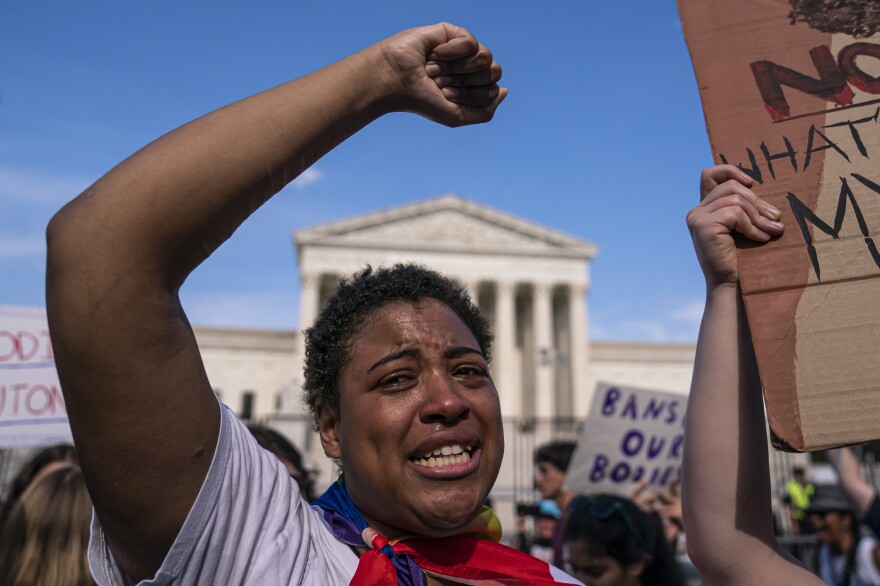There was a lot that happened in politics in 2022, from the consequential midterm elections to the U.S. Supreme Court's historic abortion ruling and record migration at the southern border.
Meantime, the country is still trying to recover from the COVID pandemic, while girding for a potential recession, as this year also saw high gas prices and soaring inflation.
Here are just some of the top political stories of 2022, in no particular rank or order:
Democrats do better in the midterms than expected
It's going to be divided federal government come the new year.
As expected, Republicans won control of the House, but the GOP will only have a narrow, four-seat majority, and Democrats held the Senate. The results were in large measure because of the intensity of opposition to the Supreme Court's conservative-majority decision to overturn Roe v. Wade, and the many election-denying, Trump-backed candidates who were rejected in key swing seats and competitive Senate races.
The Supreme Court overturns abortion rights
The conservative majority on the Supreme Court made its mark in 2022, stunning the country by overturning the right to an abortion in the U.S.
But that was just the headliner. It also weighed in on gun rights, environmental regulations, immigration and more, and appears ready to take aim at race-based affirmative action with a decision coming by June.
President Biden appointed Ketanji Brown Jackson to the Supreme Court, making her the first Black woman to sit on the high court. But her appointment did not change its ideological balance, which now tips decidedly in conservatives' favor.
Inflation, gas prices hit highs
There are fears of a recession on the horizon, as inflation in 2022 hit decades-long highs. Gas prices and food costs soared, and with Democrats in control of Congress and the White House, it put them on their heels in this year's midterms. The Federal Reserve raised interest rates multiple times throughout 2022, squeezing borrowing in hopes of stemming inflation. That all had the effect of burdening Biden's approval ratings, which remained in the low-40s for much of the year.
Record number of migrants at the southern border

Arrests along the border topped 2 million for the first time. It has caused political headaches for Biden and his administration, and led to political stunts like Texas' and Florida's governors sending migrants to Democratic-controlled cities and enclaves.
All the while, there has been no movement on a comprehensive federal immigration overhaul in almost a decade in a country that has millions of immigrants living in the U.S. after crossing the border illegally and massive backlogs in immigration courts due to understaffing and underfunding.
A productive Congress
Despite a 50-50 Senate and the legislative filibuster still in place, Democrats — and sometimes, some Republicans — were able to get quite a bit done in 2022, from the Inflation Reduction Act, which tries to address climate change and the cost of prescription drugs; to the CHIPS Act, which aims to boost domestic manufacturing of semiconductor chips; to taking a step toward protecting same-sex and interracial marriages with the Respect for Marriage Act; to reforming the Electoral Count Act and funding Ukraine's defense against Russia's invasion.
Russia invades Ukraine
Russia's move tested Biden's ability to maintain NATO unity and get funding from not just the U.S. Congress but the governments of those other countries. Ukraine has held off Russia in a deadly war that has lasted since February.
More funding will be needed and was a major reason why Ukrainian President Volodymyr Zelenskyy made his first trip outside the country since the war began, cloaked in secrecy, to the United States and addressed Congress this month.

Trump announces for president again
The former president remained very much on the political scene and will continue to — whether leaders in his party like it or not. Trump announced — exceedingly early — that he is running for president again, just a week after Republicans underperformed in the midterm elections, with many pointing the finger at Trump for why. Many of his endorsed candidates lost in purple states, highlighting his political weaknesses.
He also remains under the cloud of multiple investigations: his Florida home, Mar-a-Lago, was searched due to the removal of classified documents from the White House; the Trump Organization was found guilty of decades of criminal tax fraud; a special counsel is overseeing a federal investigation into the former president; and several years of his taxes were turned over to Congress and partially released Friday.
The Jan. 6 hearings
The tightly scripted hearings featured never-before-seen video and explosive testimony from people who participated in the deadly riot, local elections officials and people who worked in the Trump administration or on his campaign hoping to get him reelected. They painted a picture of a then-president who inspired a mob of his supporters to storm the Capitol and did nothing to tamp down the violence for hours despite watching it all unfold and being urged to do so.
But many Trump supporters never watched. Instead, it was mostly Democrats and, according to polling, a slim majority of independents who paid closest attention — and blamed Trump more for what happened afterward. Now, with Republicans set to take control of the House, the select committee will be disbanded and the two GOP members on the panel won't be returning to Congress.
Hurricane Ian and other weather-related events
Extreme weather events and billion-dollar disasters continue to be more common than they were decades ago. This year saw the catastrophic damage wrought by Hurricane Ian. There was record drought in the West and low levels in the Mississippi River, along with extreme rainfall and flooding in other parts of the U.S. It's all taking a toll on communities. And it means local and federal leaders are scrambling in the short term to come up with disaster recovery funding and unable to, in a consistent and united way, prepare for the long term.
Uvalde, Buffalo mass shootings lead to gun legislation

This year again saw many more mass shootings. In two instances just days apart, 10 Black people were killed in a supermarket shooting in Buffalo, N.Y., and 21 were killed, including 19 children, in a school shooting in Uvalde, Texas.
The incidents led to modest gun reforms signed into law. It was the most significant gun legislation signed in decades, but that only shows how difficult it is to get sweeping changes passed federally, like raising the age of who can purchase certain firearms or whether the country could ever return to an assault-style weapons ban.
Other mentions: Some other big events included Nancy Pelosi stepping down as House Democratic leader after two decades, making room for Hakeem Jeffries of New York and a new generation of party leaders. The year also saw political violence with Pelosi's husband, Paul, attacked in their California home and Supreme Court Justice Brett Kavanaugh targeted, which led to stepped up security for the justices.
Copyright 2023 NPR. To see more, visit https://www.npr.org.




